|
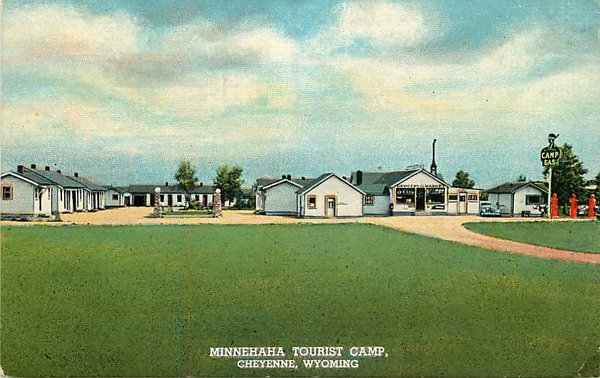
Minnehaha Tourist Camp, East Lincoln Way, Cheyenne, 1940's,
1905 E. Lincoln Way, Cheyenne.
The Minnehaha advertised that it had groceries and a service station "in connection."
In the 1930's the cabin courts began to be upgraded or replaced by motels, but even as late as
1940, Duncan Hines in his "Lodging for a Night" recommended only five lodgings in Cheyenne. [Writer's note, Photos have been added, they were not in
Duncan Hines' book. As used by Hines, "WB" denotes "With Bath":
"Hotel: Frontier. Many like this hotel which is smaller than the Plains.
100 rms., many WB. Meals. E. 2NB $3.00. 2WB $4.00. Gar. 50c. No dogs."
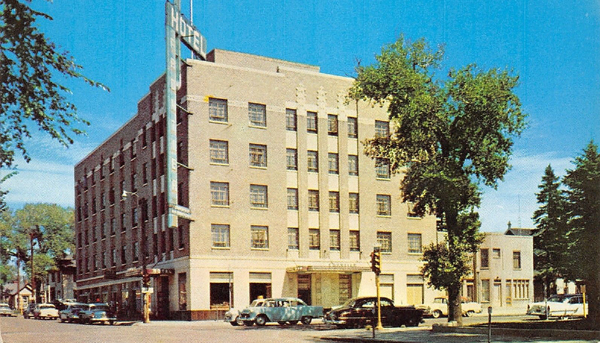
Frontier Hotel,
Cheyenne, approx. 1955.
"Hotel: Plains. One of the best between Chicago and Salt Lake City on
the Lincoln Hwy. Decorated in breezy western manner. 200 rms., 125 WB.
E. 2NB $3.00. 2WB $4.50-$5.00. Gar. 50c."
For discussion and photos of the Plains see
Plains Hotel
"Motor Court: Cheyenne Motel. Eastern city limits. 20 cottages, all
WB., and kitchenettes. E. 2NB $2.50. FGar. Pets P."
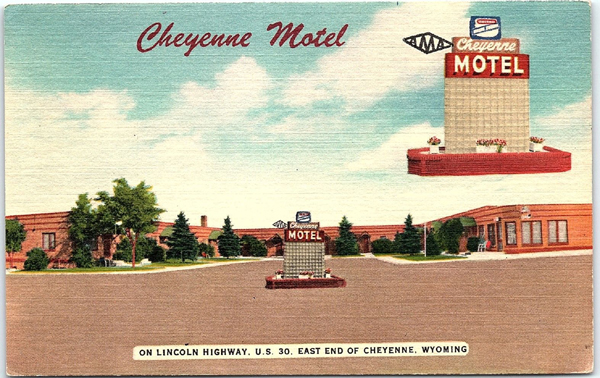
Cheyenne Motel, East
Lincolnway, Cheyenne, 1940's.
"Motor Court: Indian. West of town. Attractive and new, less than 1 yr.
old. Steam heat. 35 cottages, all WB., and 15 kitchenettes. Meals. E.
2WB $2.50 up. FPark. or Gar. Pets P."

Indian Village Motel
Lincolnway, Cheyenne, approx. 1954.
"Motor Court: Mission. 222 E. Lincoln Way. Handy location. 10 cottages.
46 guests. E. 2WB $3.00 up. FGar. Pets P."
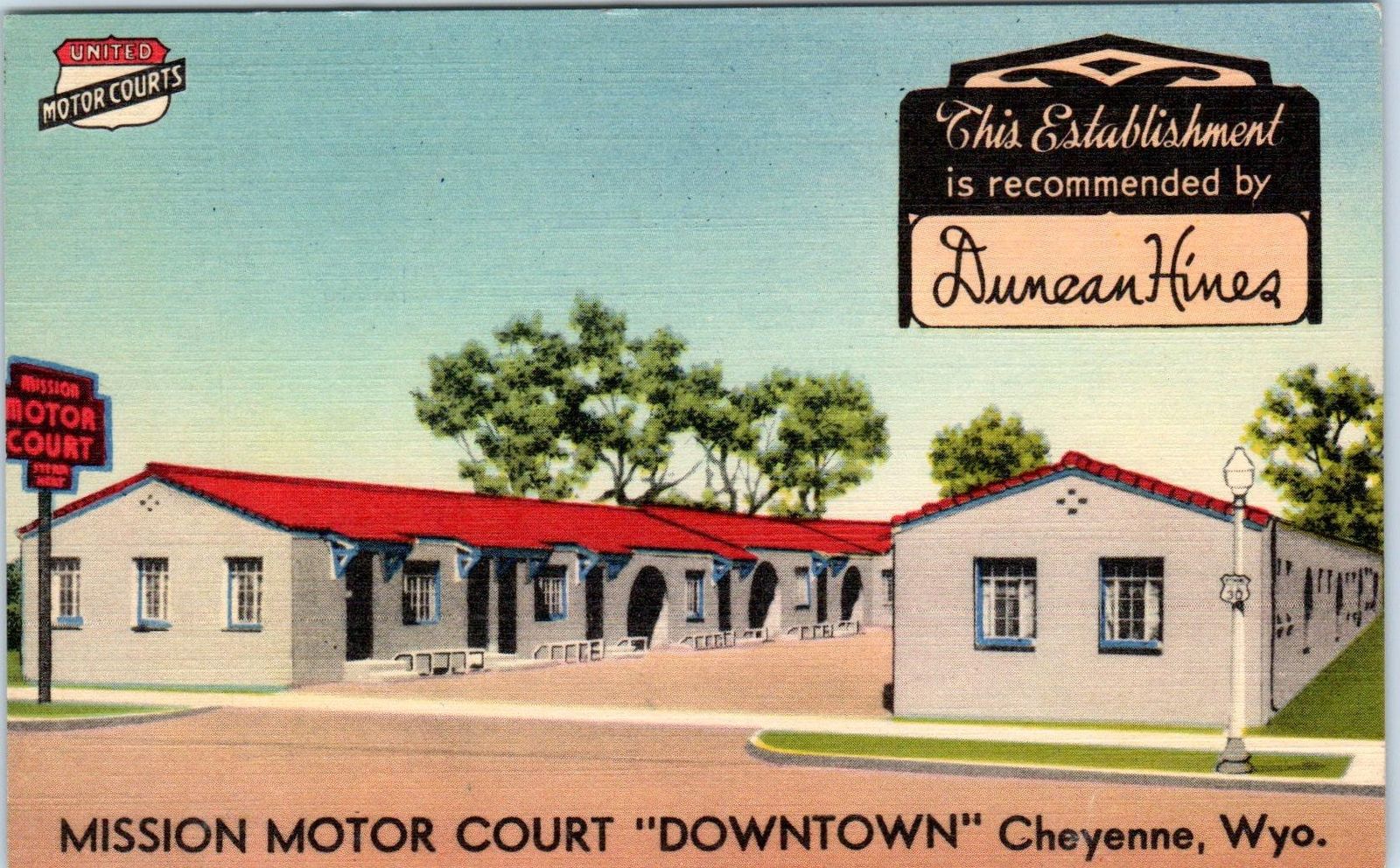
Cheyenne Motel, East
Mission Motor Court, Cheyenne, 1940's.
Hines continued:
Note: Cheyenne is a popular stopping point and good accommodations are limited. Consequently, get in early or make
reservations. Also, there are other courts of similar names so
note above addresses carefully.
Hines in the introduction to his 1940 edition wrote:
The newest development in lodging facilities, and one addressed
particularly to those who travel by auto, is the type of accommodation
which has come to be designated as an auto court. The modern auto
court of unified design is not to be confused with the scattered and
heterogeneous growth of cabins of every type and description. The
single detached cabin, even though containing elementary conveniences
of the Chick Sales [sic] type, represents at best but a primitive effort to
meet the modern needs of the discriminating motorist.
The modern auto court, too, has its own peculiar advantages over
many hotels. When under competent management, it offers the motorist
the maximum convenience in pleasant and comfortable lodging
accommodations.
Writer's note: The reference by Hines to "Chck Sales" is to a common euphemism in the 1930's and 40's to a privy.
The name cames from Charles "Chic" Sale (1885-1936) an American humorist and actor originally from
South Dakota who wrote a short sketch, Lem Putt, Specialist, Putnam & Company, Ltd. London, 1929. Putt
was a building contractor who specialized in construction of privies and who took pride in his work.
Sale assures us the stories are true although names were changed. The sketch discusses the
details of quality construction, whether the door should open in or out (in, so if one is sitting enjoying the sun, and someone
comes along, the door can be kicked shut), the ventilators (the crescent or star over the door), whether there should be a window,
a nail or hook for the Sears Robuck catalogue, the size of the pit, the color (so it can be easily seen at night), and anchorage.
The book concludes with the story of
of a privy constructed for a farner named Elmer whose neighbor's sons constructed a new privy in order to save money.
One Hallowe'en night the neighbor was using the facility.
when some boys turned it over with the neighbor in it. It had not been properly anchored.
Putt got the contract. It was the best privy in the county except for an "eight holer" that Putt constructed for a school. when Putt in the blues, he would drive out to
Elmer's:
When we gets to the top of the hill overlookin' his place, we stops.
I slips the gear in mutual, and we just set there lookin' at the
beautiful sight. There sits the privy on that knoll near the woodpile,
painted red and white, mornin' glories growin' up over her and Mr.
Sun bathin' her in a burst of yeller color as he drops back of them
hills. You can hear the dog barkin' in the distance, bringin' the cows
up fer milkin' and the slow squeak of Elmer's windmill pumpin' away
day after day the same as me.
As I look at the beautiful picture of my work, I'm proud.
I heaves a sigh of satisfaction, my eyes fill up and I sez
to myself: "Folks are right when they say that next to my eight holer
that's the finest piece of construction work I ever done. I know I done
right in specializin'; I'm sittin' on top of the world; and I hope
that boy of mine who is growin' up like a weed keeps up the good work
when I'm gone."
Writer's note continued. It kind of reminds me of an incident during the War. My father knew a real estate
broker who got a listing on a farm from a couple who were retiring. To ensure a sale,
inside plumping was needed, with difficulty the fixtures were obtained. It was recommended that
the small structure on a knoll in the back yard should be removed and the hole filled in. Ads were placed and soon
a couple from a nearby city came. It was just what they were looking for. It was winter and the snow covered the knoll with a crust
which forms after a slight thaw and freeze. The wife went to the knoll for the last look.
Needless to say, the sale was not the only thing that fell through.
By 1948 the Minnehaha had been upgraded as a motor court and received a Duncan Hines recommendation.

Lincoln Court,
Minnehaha Motor Court,Lincolnway, Cheyenne. Compare to uprights in front and roofline of the
left portion of the Court with the postcard toward top of page.
And yet again the Court was upgraded and renamed as the "Firebird Motel".

1905 Lincolnway, Cheyenne.
>
In the 1960's Interstate 80 was constructed. This undoubtedly had an impact on the Lincoln Highway through Cheyenne, particularly on the
east end.The decline is perhaps reflected in the motels on Lincoln Way.
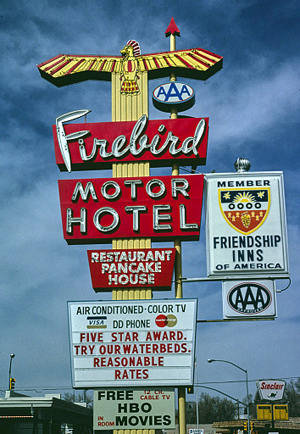 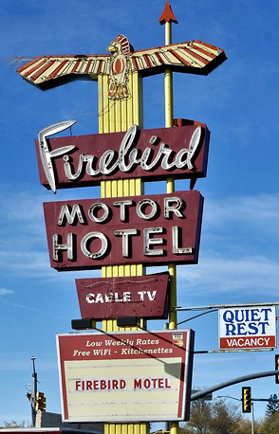
Signage for Firebird Motel near intersection of E. Lincolnway and Logan.
Left, sign for the Firebird Motel, 1980, Right, sign for Firebird, 2018.
East Lincolnway.
In the above photo, note loss of AAA recommendation and loss of affiliation with a national chain. The neighborhood seems to have gone down a bit.
Across the intersection is a sign advertising the phone number for a massage. In the next blcok is another motel which had been the scene of a
"meth murder," a stabbing, use of various drugs, and as to which a local radio morning host aimed his
acerbic comments. It, of course, was not the only target of his wit. He also took aim at another lodging
facility on West 17th. He also commented that the City should adopt as its slogan that it is the
Home of a particular hotel on East Lincolnway.
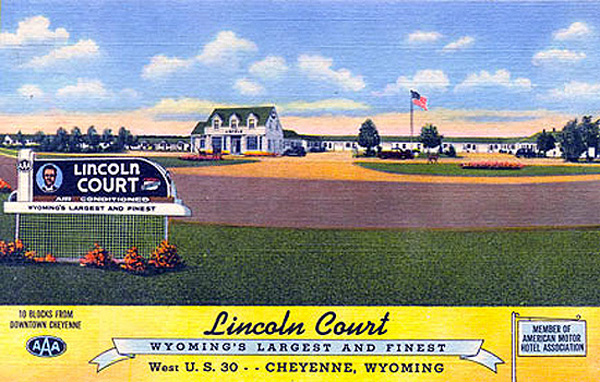
Lincoln Court,
Lincolnway, Cheyenne.
The most famous of Cheyenne's early motels
was the Lincoln Court established
in 1927 by Pete Smith on the West Lincoln Way. The Court originally had 25 rooms.
Pete's son, Harry Smith, took the court over in 1938.
Harry's son Paul, in turn, took over the
operation in 1982. Over the years, the facility expanded to 177 rooms, three restuarants all of which were recommended by
Duncan Hines [Source: Visit to the Hitching Post's website, October 22, 2018. See below], two lounges, and
a conference center. In 1965, there was a kitchen fire and for a while food service was in a tent known
as the Hitching Post Chuckwagon Buffet. The name "Hitching Post" or simply the "Hitch" stuck. The property became a favorite
with legislators at one time attracting during sessions some 60 to 70 members. The dimly lit Rodeo Bar was especially
popular. Dim lights possibly made it difficult to see who was lobbying whom. Some 40 years ago, the writer was invited in another state for a
beer in a legislative watering hole. In the darkness, the person to whom the writer was talking seemed to be merely
a silhouette.
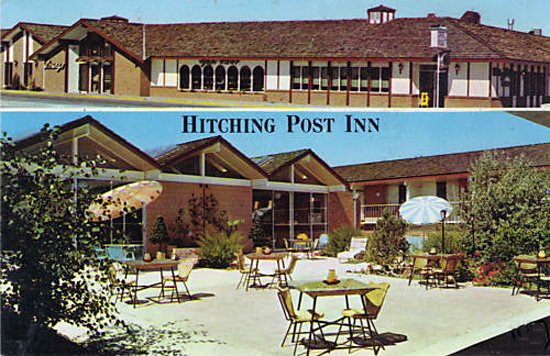
Lincoln Court,
Lincoln Way, Cheyenne.
In April, 2006, Paul died and the property was put up for sale, selling in December 2006. The new
owners did not seem to have the magic touch and the property began to go down hill. Most of the
legislators ditched the Hitch. In February 2009, the property filed for bankruptcy and closed in
September 2009, with numerous health and safety violations. The bankruptcy caused the New York Times, Feb 9, 2009, to
write of its history:
And the Hitch, as lawmakers came to call it, in turn became more than just
a hotel. It insinuated itself into how the State Legislature worked by
creating an informal space where lawmakers in their socks, sometimes
with a highball in hand, could wander down the hall and knock on the
door of a neighbor and talk through the day.
The Hitch’s owners once boasted that more law was made there than under
the Capitol dome if only because of propinquity and its rituals: a big
restaurant table always on reserve, a staff required to memorize the
name and face of every lawmaker, and rock-bottom room rates for
senators and representatives, to lure in the lobbyists who paid more.
Indeed, at one time the Hitch posted on its sign the messages "Welcome Lobbyist," "Welcome Legislators."
The Times compared the Hitch with Helena's Placer Hotel which had a tunnel to the
Montana Club and Bismark's Patterson Hotel with its "Peacock Alley" and a tunnel leading to the railway depot.
The Hitch was never in their
league. At its peak maybe the Plains Hotel might have come close. But its Peacock Alley
was merely a hallway leading from Capitol Ave. to the bar.
The Hitch was subsequently sold and was undergoing renovations
until in the early morning hours of September 15, 2010, two weeks from scheduled reopening,
a passer-by noticed flames coming from the lobby building.
The kitchen and lobby areas were destroyed. Subsequent to the fire, five different individuals plead guilty to
involvement in the fire or to insurance fraud. The last defendant entered a plea in March of 2018.
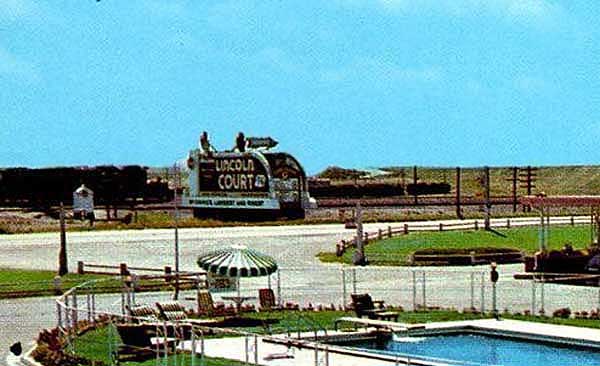
Lincoln Court,
Lincoln Way, Cheyenne.
For a while the unburned part of the property
reopened, a sign guiding travelers past the weed over-grown portion of the property where the lobby had once stood to a temporary
reception desk in an area where unburnt guest rooms were located. The property received poor
online reviews. It finally closed in 2017 when the water and power were turned off. On October 22, 2018, at 10:50 a.m. Mountain,
the writer visited the Hitch's website which had never been taken down or updated since 2006. Some of the internal links including the one to the Rodeo Bar
were down as well as the link for reservations.
Twelve years following Paul Smith's death, the website still listed
Paul Smith as the owner.
Next page, Lincoln Highway, Cheyenne west to Buford.
|